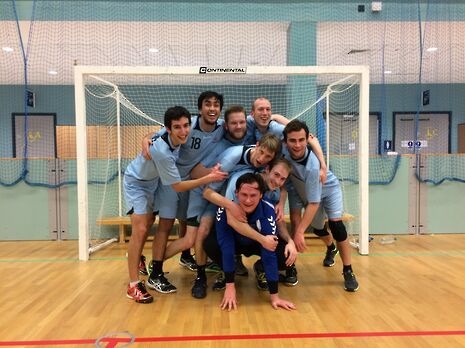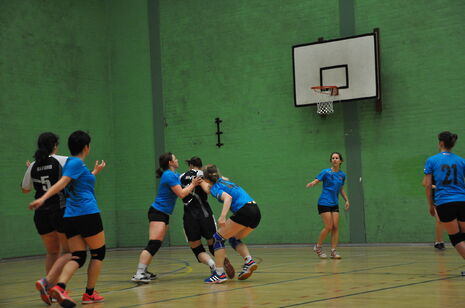Rogue Sport of the Week: Handball with Daniel Bode
Paul Hyland gets the lowdown on a sport that’s huge in Europe but never really taken off over here
Athlete Profile
- Name: Daniel Bode
- College: Clare
- Degree: Stem Cell Biology, PhD
- Hometown: Hamburg, Germany

Though handball is all the rage on the Continent, Daniel Bode is a European who first came to play the sport on these shores. The Russian-born Hamburg resident was born into good stock, with his father even representing his country in the sport. But it was only when Bode took an undergraduate degree at the University of Dundee in Scotland, where he also took to playing tennis, that the sport of handball really captured his imagination.
Now working towards a PhD in stem cell biology here in Cambridge, the Cambridge University Handball Club president gives us the lowdown on the sport that keeps him occupied when he’s not in the lab.
Can you give us a summary of handball at Cambridge?
Cambridge is one of the most exciting places to play handball. Our female and male teams are comprised of experienced players and beginners, which creates an environment of camaraderie and mentorship. There’s a close bond between all players, both on and off the pitch. We compete in the UK university championships, and of course, Varsity! The club has grown significantly over the last few years as well, and that’s reflected in the men’s team being crowned UK university champions two years ago. The women’s team currently has more members than ever before. Overall, we are open to everyone at every level.
How did you get into it?
I am originally from Germany, where handball is a very popular sport – second only to football. It was also a big part of my childhood. Before I was born my father played handball at national and international level, though oddly enough, I only started playing handball at university, when I began my undergraduate studies in 2011.
What’s the hardest thing about the sport?
Handball combines attributes from many different sports and is very dynamic. So coordination is paramount, but that requires some time to master. Knowing how to effectively stop an opposition player in defence, or out-manoeuvre a defender, are difficult tasks. It takes a while to develop your experience, balance and control of your movements.
What do you need to be a success at it?
Motivation is beneficial! Also the beauty of the sport is its versatility, requiring slightly different skills for different positions. However, the most important trait in handball is team-play and the will to work together with the players around you. The beauty of the sport is that teamwork is the only road to success. Creating opportunities to score and defend effectively requires constant communication and selflessness. For example, a team with only one exceptional player, who does not work with their teammates, will not succeed.
Who’s the most famous handball player at the moment?
There are several exceptional players in world handball. Mikkel Hansen, currently playing for Paris Saint-Germain Handball, is one of those. He won the world handball player of the year award twice and is nicknamed ‘the Hammer’. He’s been a consistent top scorer for club and country for the past decade.
Heidi Loke is also one of the sport’s heroes. Her remarkable sporting achievements go far beyond that of most players and she is a role model for many aspiring handball players.
What’s the state of the sport in Cambridge? What kind of facilities and competition do you have access to?
We compete in the annual university championships, which are attended by more than 30 UK universities and around 500 players. The tournament is played at two weekends, first a qualification stage and subsequently the cup, trophy and plate finals, depending on the qualifying group position. These tournaments are hosted in different cities across the UK.
Equally important, we compete in Varsity. There are several halls available to us: we train at the University Sports Centre and Trumpington Community College, close to Addenbrooke’s Hospital. Beside the University team, Cambridge is also home to the Cambridge Handball Club and the Cambridge Wolverines, which both play in the First Division and conduct great youth team work. Having these teams in close proximity allows for collaboration and interaction, which is beneficial to all clubs involved.
Handball’s really popular on the Continent but not over here. Why do you think that is?
In comparison to other traditional sports, such as football, rugby and cricket, the widely played indoor form of handball is relatively new. Naturally, establishing a new sport amid such a plethora of popular sports is not an easy task.

But in my opinion there is also a logistical reason for the difference in popularity. Major UK sports are played outdoors and existing indoor facilities often do not have appropriate dimensions for a handball court. It is difficult to find satisfactory venues at a youth and amateur level, let alone professional venues with facilities for spectators. So it’s more difficult to raise awareness to the same extent as in continental Europe. That said, recent developments are promising and handball is among the fastest-growing sports in the UK.
What’s your training schedule like?
We currently train twice a week, every Tuesday evening, 6pm to 8pm, at the University Sports Centre and Sundays at the Trumpington Community College from 11am to 1pm.
How do you reconcile it with Cambridge?
Pursuing your studies or research requires a healthy mind. Regular exercise and sport are key to physical and also intellectual fitness. What better way can there be than getting together with a nice group and play handball?
How would you persuade someone to get involved?
If you like dynamic, fast-paced sports with an element of physicality and above all teamwork, then handball is the right choice for you! You will make great friendships and be part of a community that supports each other both on and off the pitch. We all go away for entire weekends, almost like a road trip, and the competitions are great fun as well.
This interview has been edited for length and clarity
 News / Fitz students face ‘massive invasion of privacy’ over messy rooms23 April 2024
News / Fitz students face ‘massive invasion of privacy’ over messy rooms23 April 2024 News / Cambridge University disables comments following Passover post backlash 24 April 2024
News / Cambridge University disables comments following Passover post backlash 24 April 2024 Comment / Gown vs town? Local investment plans must remember Cambridge is not just a university24 April 2024
Comment / Gown vs town? Local investment plans must remember Cambridge is not just a university24 April 2024 Interviews / Gender Agenda on building feminist solidarity in Cambridge24 April 2024
Interviews / Gender Agenda on building feminist solidarity in Cambridge24 April 2024 Comment / Does Lucy Cavendish need a billionaire bailout?22 April 2024
Comment / Does Lucy Cavendish need a billionaire bailout?22 April 2024





